By Lucy Komisar
Aug 27, 2019
The European Court of Human Rights in Strasbourg has just released a very flawed decision in a case brought by the widow and mother of Sergei Magnitsky and lawyered by a George Soros-funded Open Society Justice Initiative. I will analyze it soon, but this is a quicker take on a report by the BBC, which is published without a byline and is even more flawed. I will deal with the judgment shortly, but important to see what the corporate media tells the world.

The Fake whistleblower
Magnitsky, of course, is the accountant who was jailed in Moscow in November 2008 as a collaborator in massive tax evasion by William Browder, who was running the Hermitage hedge fund. He died nearly a year later. Attempting to create a smokescreen against the tax charges, Browder told a credulous world that Magnitsky was arrested for “blowing the whistle” on a 2007 fraud against the Russian Treasury. That is contradicted by the facts and by credible evidence that Browder was involved in the fraud.
The BBC has been a stalwart supporter of Browder‘s story; challenges to his fakery are not allowed.
The BBC writes that Magnitsky was advising William Browder‘s Hermitage Capital Management “when he alleged the theft of $230m ( £185m; €206m) by tax officials.”
That is absolutely untrue. He was interrogated in October 2006 and in June and October 2008 about the tax fraud he helped Browder commit, and in his last testimony mentioned the 2007 unrelated theft of money from the Russian Treasury. But he said nothing about tax officials being responsible for that. Read his testimonies.
BBC calls him “The whistleblower.” Untrue. Rimma Starova was the whistleblower.
The tax refund fraud involved criminals using shell companies to make fake legal claims against real companies that were complicit and agreed to pay damages. They turned out so large they cancelled out the companies’ profits and allowed them to request tax refunds. This was done with Browder’s companies in 2007. (They were actually shells used to hold shares, not operating companies.)
The Browder companies used in the 2007 Treasury fraud had been “sold” to the Russian shell Pluton, then re-registered again, this time to Boily Systems, listed in the British Virgin Islands. Its Russian nominee director Rimma Starova in April 2008 saw an article in the daily Kommersant about authorities charging Browder in absentia for tax evasion and investigating some of his shell companies, including those now owned by Boily Systems. She worried the trail would lead to her and days later, she went to the police.
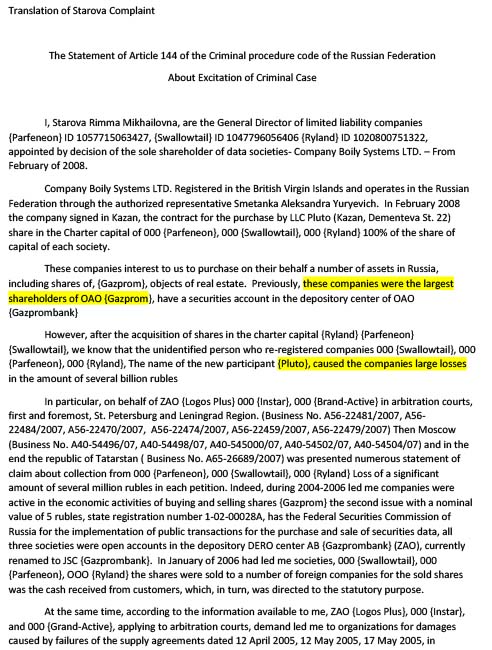
In her April 9th statement, she said she was the nominee director of company that owned the “stolen” shell companies which had been the largest shareholders of Gazprom. She told about the fake lawsuits that created fake liabilities and the fabrication of falsified certificates of debt in the amount of 13.5 million rubles that would be equivalent to the companies‘ profits. She said Kone and Glendora – Browder‘s Cyprus shells – were behind this. She would make another statement July 10th that the companies appear to have stolen 5.4 billion rubles from the state. That would be the $230 million they had paid in taxes. After her report, Russian authorities started investigating the fraud.
The BBC apparently does not know about this.
Mistreatment
BBC: “Judges in Strasbourg found that he was ill-treated by guards and denied care.” The court provided no evidence of ill-treatment by guards.
It writes with no citation: “Guards also beat him with a rubber truncheon, causing several injuries.” The judgment does not say that.
Magnitsky was indeed denied needed care, as everyone agrees. But the court supplied no evidence that he was ill-treated by guards. None.
The judgment cites two documents that handcuffs and a rubber truncheon had been used. But the court acknowledges that witnesses say a truncheon was not used. And Magnitsky’s mother said in Andrei Nekrasov’s film The Magnitsky Act: Behind the Scenes, that the mention of a baton in a document was a mistake.
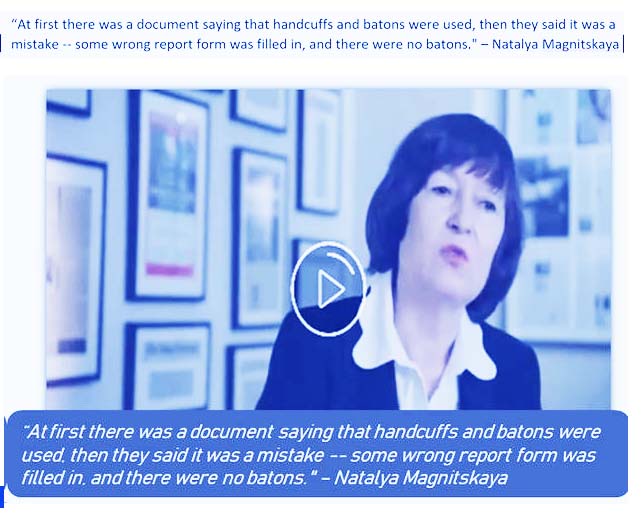
However, Browder would use that mistake that to recreate what looks like a forgery, with handwriting traced from the first document.
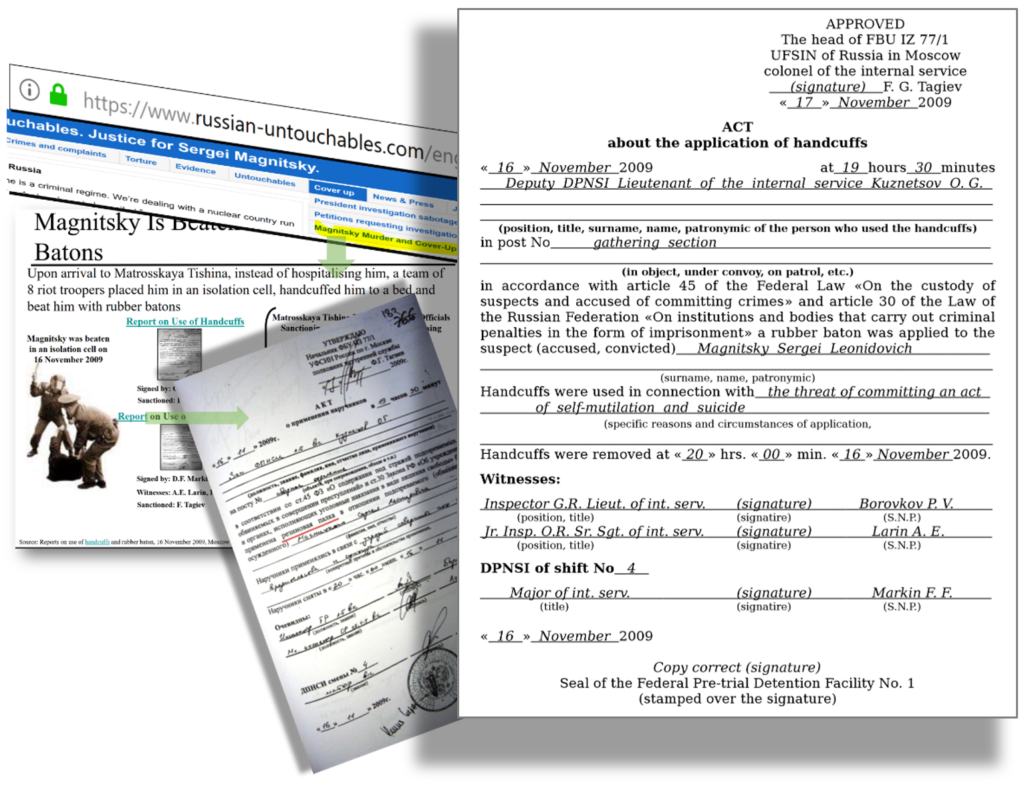
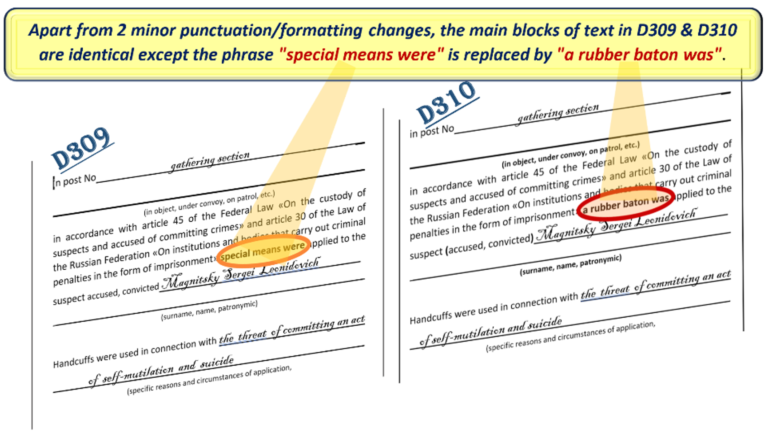
Then the judgment talks about a possible head trauma in the death confirmation certificate. But that document said “closed craniocerebral injury?” which raised the question of a past injury. The judges didn‘t find it necessary to note that the same document said “no signs of violence detected.”
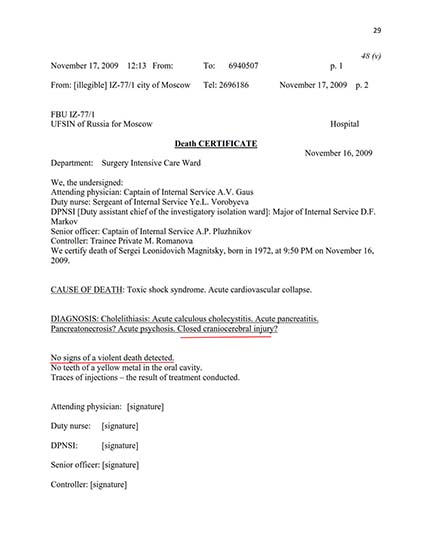
Though it is interesting that the judges noted: “The medical examination had not disclosed any traces of violence on Mr Magnitskiy‘s body, having thus disproved the suspicion that he had been beaten up with a rubber truncheon on 16 November 2009. The injuries on the wrists had been caused by handcuffs, while bruises and abrasions on the left hand, left shin and right ankle had been self-inflicted when Mr Magnitskiy had behaved aggressively.”
The BBC says: “An initial investigation by Russia’s Presidential Human Rights Council concluded he had been severely beaten and denied treatment.” The report, cited by the Court, was repudiated by Kirill Kabanov, the chair of the Council, in a 2015 sworn deposition in U.S. Federal Court in New York.
He said the group hadn‘t done its own investigation, or held hearings, that the findings were based on documents from Browder and Valery Borschev, who he identified as head of an NGO dealing with prison conditions, who provided no documents about other issues, such as the alleged theft of funds from the Russian Treasury. [Borschev‘s NGO, the Moscow Public Oversight Commission, had detailed poor conditions and lack of medical care in the prisons holding Magnitsky, but said nothing about him being beaten to death.]
Kabanov said, “The documents submitted by Browder were related to a purported investigation conducted by Sergei Magnitsky into the alleged embezzlement of funds from the Russian Treasury. It was those particular documents, which we essentially copied verbatim, which we relied upon to make some of our preliminary findings.”
BBC: After Magnitsky‘s death led to an international outcry “Russia went ahead with a posthumous trial of Magnitsky and in July 2013 he was found guilty of tax evasion.” However, it does not say that the trial occurred at the request of Magnitsky‘s family for “rehabilitation.”
The widow and mother now deny this and say they asked for the proceedings to be stopped. The judgment does not provide documents on either side. Though I find it odd that a court should drop a case against an accused criminal just because his relatives don‘t like it. What relatives do like it? In fact, the court found Magnitsky guilty and dismissed the case, according to law, because he was deceased. See this.
The judgment says “Allegations that he was beaten by guards before he died are credible.” Since when does a court base decisions on “credible” and not “proven”?
The BBC does acknowledge: “However, the court rejected a complaint that his arrest and detention were ill-founded.” Well, of course, the Russians had extensive evidence that Magnitsky collaborated with Browder on the Hermitage tax evasion.
But the rest of the story is a stinging indictment of the BBC as a Russophobic enterprise which appears to have forgotten that journalism means checking the facts.
My Fault Lines radio interview Aug 28th on the the Court‘s judgment and BBC‘s coverage. Periscope: Take Two! What is Bill Browder Up To?


Pingback: European Court of Human Rights says Russians right to arrest Magnitsky for tax evasion, but claims w/no evidence violent death – The Komisar Scoop
Pingback: “The Magnitsky Myth” Lucy Komisar podcast, host Joanne Leon – The Komisar Scoop